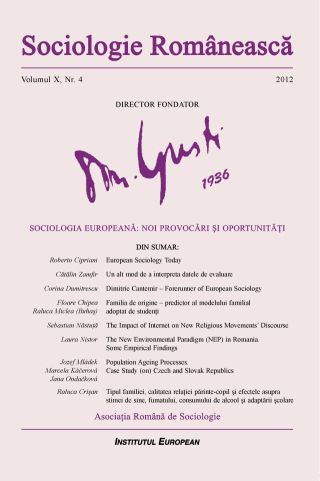The Impact of Internet on New Religious Movements’ Discourse
The Impact of Internet on New Religious Movements’ Discourse
Author(s): Sebastian NăstuţăSubject(s): Social Sciences
Published by: Editura Eikon
Keywords: Internet and religion; religious practice; new religious movements; religious discourse
Summary/Abstract: The unprecedented development of the Internet in contemporary world and its increasing influence in people’s life produce, inevitably, an impact on religious practice. This paper is interested to analyze the manners Internet and web-based religious communication affects New Religious Movements’ public discourses and the manner these groups’ construct their own religious messages to atract more adherents, via Internet. We intend to demonstrate that communication through Internet positively influences the way NRMs construct their own religious messages to atract new adherents, that NRMs’ public discourse is influenced by their self-positioning as cultural and religious alternatives, and also by extensive Internet usage in disseminating and constructing their religious discourse. As Internet impacts most religious groups’ communication we want to underline those elements specific to NRMs’ communication. To depict the specificity of Internet’s impact on NRMs’ discourse we’ll first underline some general transformations within religious life and practice induced by longterm social changes, like modernization or globalization. These generate deep cultural transformation on people’s mentality, and religion become, in Western societies, rather a cultural product (Beckford), a projects of the autonomous self (Hoover) dominated by a turn to subjective-life (Woodhead). Mediatization of religion (Hjarvard) generates interesting phenomenons, like “banal religion” (Hjarvard), “hyper-religion” (Possamai) or “cultural religion” (Albanese), while the Internet creates many posibilities of action on religious field for any individual. From challenging traditional religious authorities to creation of a new churchless religion, the Internet allows, especially to New Religious Movements, to attract more followers using the Internet. After these demarcations we’ll underline the specific effects of Internet on NRMs’ discourse. As these groups are much interested in attracting new followers and being more persuasive to outsiders, their public discourses become less traditional, less theological and more flexible, more marketized and follower-oriented.
Journal: Sociologie Românească
- Issue Year: 10/2012
- Issue No: 04
- Page Range: 61-74
- Page Count: 14
- Language: English

